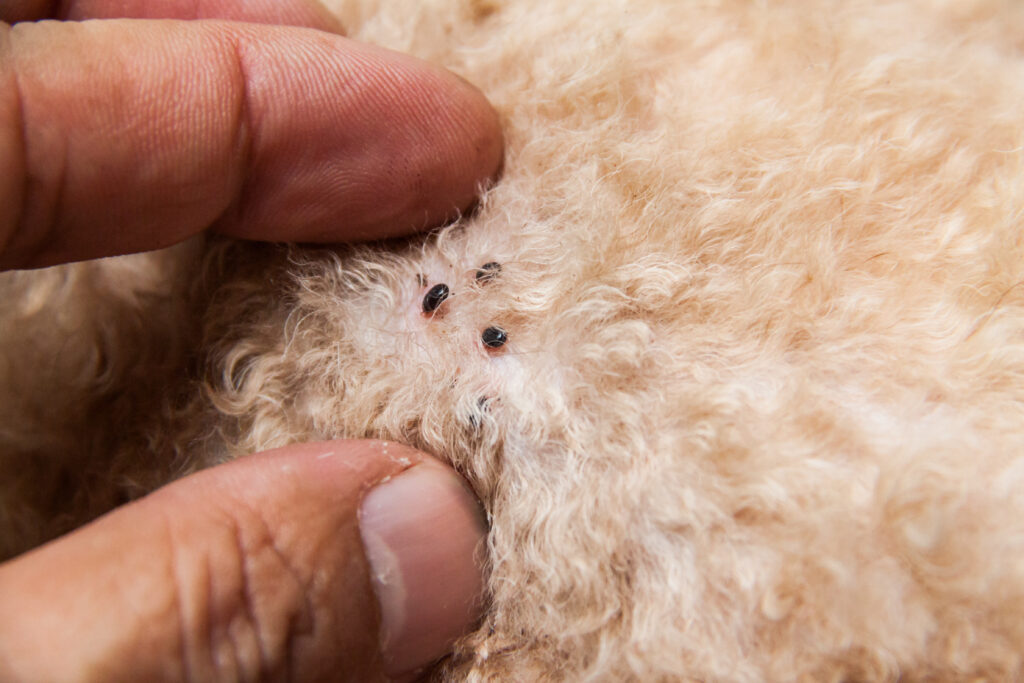When your eye starts watering, and you sneeze so much it sounds like a tiny train ah-chooing its way down the street, you probably have allergies. You might look at your pup and wonder if they can have the same problem, or you might suspect that they do have allergies.
Can dogs get allergies, though? Yes, they can. There are three different types dogs can get, and each can have varying symptoms. In this post, you’ll learn about what kinds of allergies happen in dogs and what you can do to help them.
Finding out the cause, treatment, and prevention will make your pup feel their best. It will also comfort you, knowing that it’s not an underlining issue that is more serious after a vet gives your dog a check-up. So try not to sneeze while you finish reading this post!
What are Allergies?

Allergies are a normal immune reaction to foreign material.
©Brian A Jackson/Shutterstock.com
An allergy happens when the immune system becomes extremely sensitive or reactive to an allergen, a particular material, when an individual has an allergy. Proteins from plants, animals, or foods make up the majority of allergies.
Consider allergies an unneeded but normal immune reaction to foreign, benign material. Allergies cause intricate immune responses that are highly complicated. In most reactions, allergen protein molecules merge with blood antibodies, and then attach to a mast cell.
The body’s various tissues contain mast cells. Mast cells react with antigens and antibodies, releasing chemicals leading to inflammation, including redness, swelling, and itching. This inflammation causes many symptoms connected to an allergic reaction.
The Different Types
There are three types of dog allergies that can be caused by several factors. Environmental, fleas, or food can cause allergies. This section will cover the three types and what can cause them. This will help you be aware of what may be causing your doggie grief. Finding the cause is the best way to understand treatment and prevention options.
Environmental Allergies
Dog allergies caused by irritants from the environment are typically seasonal. Other factors that can cause this are dust mites or mold. Most irritants have seasonal variations and exhibit increased aggression at specific parts of the year.
We, humans, are all too familiar with how seasonal allergies can aggravate existing conditions. Neither our pets nor we enjoy them. Dogs like to spend a lot of time outside, so it’s hard to avoid coming into contact with some offenders.
In the spring and fall, dogs may scratch excessively, with winter or summer months showing fewer signs. Often symptoms in dogs appear between the ages of one and three. There are some dogs more likely to suffer from environmental allergies, such as:
- Irish Setters
- Bulldogs
- Dalmatians
- Boxers
- Beagles
- Terriers
- Shepherds
Flea Allergies

© ThamKC/Shutterstock.com
A severe allergic reaction to a flea bite is called flea allergy dermatitis (FAD). FAD can strike both canines and felines. Certain proteins in the flea’s saliva, which the flea injects into the skin while biting, cause severe allergic reactions in affected pets. Some animals are so allergic that simply one bite might result in an adverse reaction.
FAD makes animals uncomfortable, and if left untreated, the intense itching and inflammation it causes can cause skin damage through repeated chewing and scratching. As a result, secondary bacterial or fungal infections may appear.
Food Allergies

Proteins, particularly those derived from foods like beef, chicken, dairy eggs, or wheat gluten, are dogs’ most typical food allergies. When a dog eats food with these ingredients, antibodies interact with antigens, causing symptoms.
But almost any food element has the potential to cause an allergy. The most frequent offenders are proteins, but other ingredients and additives may also be at fault. Depending on the type of allergy and its severity, your dog’s reaction time to an allergen may change.
In more extreme situations, your dog can react instantly, developing hives or vomiting soon after consuming the allergen. But frequently, it can take several hours or even up to two weeks for your dog to exhibit symptoms. The same often occurs for dogs with milder food allergies.
What are the Symptoms and Treatments?

Dogs itch for a variety of reasons, including allergies and fleas.
©kobkik/Shutterstock.com
Now that you understand all the causes of allergies, you need to know the symptoms and learn about treatment options. If you notice any symptoms of allergies, check with your vet for a proper diagnosis. It’s essential to ensure there is no underlying health issue that could be causing the symptoms. Your dog may need medicine for a health concern, or the vet may suggest something to treat the symptoms of allergies.
Environmental Symptoms
Although allergic rhinitis or bronchitis can occasionally be symptoms of allergies, itchy skin is typically how dogs with inhalant allergies present themselves. The disorder is additionally known as inhalant allergic dermatitis because of these clinical symptoms. The dog might lick its feet, scratch its underarms, and rub its face.
The pup should be kept away from the allergens if they can be found by skin or blood tests. In most cases, treatment with anti-inflammatory medications like corticosteroids or antihistamines will immediately stop the allergic reaction. In some circumstances, adding fatty acids to the diet can enhance how well the body reacts to steroids and antihistamines.
More alternatives prevent particular chemical signals linked to dog itch. These medicines include long-acting injections and daily oral treatments. Irritated skin can be soothed by routine bathing with a hypoallergenic shampoo. Taking a bath also removes allergens from the coat and body that could be absorbed via the skin.
Flea Allergy Symptoms
Not all dogs have flea allergies. But it might be unbearable for those who are allergic. Hair loss along your dog’s neck, spine, and thighs may be the first sign that they have fleas. Additionally, their skin could feel hot to the touch and covered in scabs. Of course, there is also the inevitable, automatic, back-foot-reaching scratching.
You might or might not notice live fleas; you might only see flea dirt, which is made up of digested blood flecks. Using a flea preventative treatment year-round is the first step in controlling an infestation. Still, this method takes some time to work because the flea life cycle can last up to two months, depending on the environment, and pupa can remain dormant for up to a year before maturing.
Along with flea treatment, deep cleaning your home can speed up the process of removing fleas and prevent further infestation. For dogs with a moderate allergic response, some vets will give Benadryl to get rid of the itching. Other oral medications, such as steroids, may be prescribed for more acute severe reactions. A dewormer might be required if the dog has tapeworms because of fleas.
Food Allergy Symptoms
Symptoms, such as itching, digestive issues, and respiratory discomfort, can result from a food allergy. Allergies might manifest at any time. An allergic reaction to food your dog has been eating for years without incident may occur suddenly, or symptoms may happen after you change your dog’s diet.
It’s not always straightforward as to whether a dog has food allergies. You have to start at the beginning, with the advice of your veterinarian, to know for sure whether food allergies cause your dog’s skin or ear troubles.
They will rule out other causes of the symptoms, such as ringworms because actual food allergies are not expected. Your veterinarian will advise a food trial once the probability of a food allergy diagnosis seems plausible. A food trial is when you only give them the prescribed diet for a few months to see if their symptoms disappear.
Conclusion
There are three types of dog allergies that can be caused by environment, flea, or food. Each one has different symptoms, and it’s crucial to note your dog’s symptoms to give more information to your vet. It’s always best to get a diagnosis of allergies to rule out any other causes.
Prevention can be helpful but not always possible in some cases, but knowing the cause and how to treat the symptoms will help you be better prepared as the situation arises. With medication or changes in your pet’s diet, you can offer them relief if allergies are the problem.
Check out our other dog articles that will help answer even the wildest questions about dogs. Please share this article with a dog owner who has a pup that may be showing these symptoms. You could help stop a dog from almost scratching their ear off!
Up Next…
- The 4 Best Dog Food for Allergies (Adult, Puppy, Senior)
- These Are the Best Dog Allergy Tests Today
- The 8 Best Ear Infection Medicines For Dogs
- Can Dogs Get Skin Tags?
The photo featured at the top of this post is © olgagorovenko/Shutterstock.com
Ready to discover the top 10 cutest dog breeds in the entire world?
How about the fastest dogs, the largest dogs and those that are -- quite frankly -- just the kindest dogs on the planet? Each day, AZ Animals sends out lists just like this to our thousands of email subscribers. And the best part? It's FREE. Join today by entering your email below.
Sources
- Canine Journal (1970) Canine Journal
- Hill's (1970) Hill's
- Pet MD (1970) Pet MD
- Animal Humane Society (1970) Animal Humane Society
Thank you for reading! Have some feedback for us? Contact the AZ Animals editorial team.







